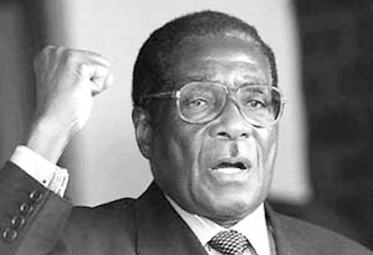Plea from gay Zimbabwean immigrant, jailed and beaten in his homeland, rejected
A federal appeals court panel majority has rejected a plea by a gay man from Zimbabwe that he be allowed to remain in the United States, concluding that despite the strongly anti-gay policies of that nation’s government, the petitioner had not shown any individual basis for fearing persecution. Incredibly, the panel came to that conclusion even thought the man had been arrested and imprisoned once for being gay before he escaped the country after jailers were bribed to let him go.
William Kimumwe, the Zimbabwean man, has fallen victim to the Bush administration’s general hostility to asylum applicants, reflected in the Bureau of Immigration Appeals’ recent practice of abandoning any serious review of Immigration Judge decisions.
The December 13 ruling by the U.S. Court of Appeals for the 8th Circuit in St. Louis drew an angry dissent from Senior Circuit Judge Gerald W. Heaney, who was appointed to the court in 1966 by President Lyndon Johnson. But Heaney’s dissent is entirely ignored in the majority opinion, written by 2003 Bush appointee Steven Colloton. The majority opinion takes at face value the deeply skeptical ruling by the Immigration Judge, while Heaney places more weight on Kimumwe’s account of events and the strongly anti-gay views articulated by Zimbabwe’s notoriously homophobic president, Robert Mugabe.
According to Kimumwe’s testimony, he twice encountered difficulties with authorities in Zimbabwe, once as a high school student, when he was expelled from school after authorities learned that he had engaged in sex with another male student, the second time when he had sex with a fellow student in college and was thrown into prison. According to Kimumwe, he was told by the police that it was “illegal to be gay in public,” and it was only because a college official bribed prison authorities on his behalf that he was released and given a document stating that he was set free due to lack of evidence against him.
Kimumwe also testified that local police harassed him by chasing him and making disparaging remarks, and that neighbors spat on him, kicked him, and threw stones at him. He also testified that on one occasion he was beaten by villagers and shocked with an electric wire.
In order to qualify for asylum, a petitioner must show past official persecution and a reasonable fear that it would recur were he returned to his home country, based on his membership in a “particular social group.” Established precedent in Bureau of Immigration Appeals courts has found gay people to be part of such a particular social group, and the Immigration Judge purported to accept that finding, but nonetheless rejected Kimumwe’s contention that he was persecuted on this basis. The IJ stated that the immigrant had not presented any “objective evidence” that he was gay, and that the two incidents he described were due to his engaging in sexual “misconduct,” not because of his status as a gay man. The Immigration Judge also said that harassment by neighbors and local authorities did not count as “official” persecution because Kimumwe had not shown that such actions were taken as part of government policy.
The Immigration Judge further rejected Kimumwe’s attempts to show that the Zimbabwe government’s anti-gay policies made it likely he would be persecuted in the future if forced to return, and this view was accepted by the appellate majority.
“While the State Department’s Country Report on Human Rights Practices for 2001 noted ‘numerous, serious abuses’ by the government, it did so in the context of a government-sanctioned campaign that targeted political opposition, not persons of homosexual status,” Colloton wrote for the appeals panel. “Thus, assuming that Kimumwe is a member of a ‘particular social group,’ the [Immigration Judge] reasonably concluded that he did not have a well-founded fear of persecution on that basis.”
The court majority refused to consider Kimumwe’s argument that he was treated unfairly in the hearing process, “because he failed to present those issues in an appeal to the [Bureau of Immigration Appeals].” This is quite ironic, since the BIA under the current administration merely rubber-stamps Immigration Judge decisions and does not consider the merits of individual cases, in a blatant repudiation of its assigned tasks.
“The IJ’s conclusion that Kimumwe has not established eligibility for asylum is simply not supported by the record,” wrote Heaney in dissent, noting that Kimumwe’s assertion that he is gay was not even accepted at his hearing.
“It is unclear what type of evidence would satisfy the IJ,” wrote Heaney. “Kimumwe testified he was openly gay. He stated he realized he was gay when he was seven years old. He presented a letter from a Kenyan orphanage administrator, Kemba Andrew Waaki, indicating that Kimumwe was gay. After carefully perusing the record, I have found no evidence whatsoever that would contradict Kimumwe’s claimed sexual orientation and accept that he is openly gay.”
Heaney also found that the Immigration Judge had “mischaracterized” the record by stating that Kimumwe was punished for his conduct rather than his status. Heaney’s description of Kimumwe’s testimony indicated that it had been twisted around to make him appear as a sexual aggressor when both cases appeared to involve consensual activity.
“Importantly,” wrote Heaney, “the IJ also overlooked Kimumwe’s unrefuted testimony that the officers who arrested him made it clear he was arrested for being gay, not for having sex.”
Finally, Heaney pointed out that Kimumwe’s testimony and the public record show that it is extremely dangerous for somebody to be openly gay in Zimbabwe. In his asylum application, Kimumwe stated that “they search for people like me” and kill them, and he introduced into the hearing record various statements by Mugabe, who had referred to gays as “sodomites and perverts” and declared that gays have “no rights” in Zimbabwe. Mugabe has stated in speeches that his government will do “everything in its power” to combat homosexuality.
“Our court ought not sanction the return of an openly gay man to a country whose leader has vowed to rid the country of homosexuals,” Heaney argued. “Zimbabwe’s government’s past conduct, both generally and with specific reference to Kimumwe, indicates an intent to further persecute him on the basis of his sexual orientation. Kimumwe has established that he has suffered past persecution and has a reasonable fear of future persecution on account of being openly gay.”
gaycitynews.com



































